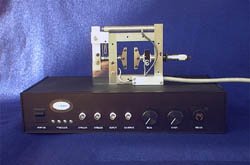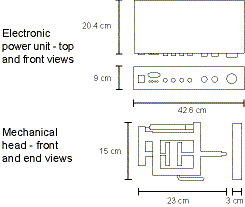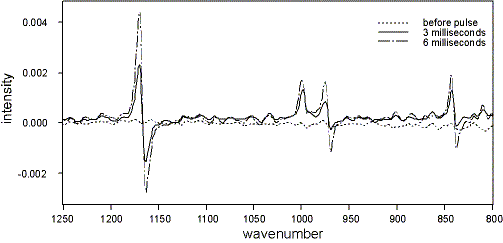Polymer Modulator ™ - PM-100 The application of step-scan FT-IR spectrometry to rheo-optical studies of polymers has attracted considerable interest from the polymer physics and engineering communities. Several studies (see, for example, Bibliography and references in those publications) have measured the time dependence of spectral changes in polymer samples during modulated strain, with the use of custom-built instrumentation. The Polymer Modulator ™ provides a convenient, commercially-available tool for combining spectroscopic measurements with rheological perturbation. The system consists of two components, an electromechanical head, where the sample is mounted, and an electronic power unit. The head is connected to the electronic power unit by a cable. The power unit contains the necessary circuits to amplify an input signal to drive the piezoelectric transducer, as well as amplifiers and signal conditioning for the stress and strain transducers. The drive waveform for the MAT Polymer Modulator ™ can be digitally produced so that the short- and long-term frequency stability are governed by quartz clock. Because the drive mechanism is piezoelectric, the applied waveform is completely programmable, with full response to component frequencies up to 70 Hz. The device is usable over more than two decades of frequency, from below 0.07 to 70 Hz, and is fully instrumented with stress and strain sensors. The frame of the device is fabricated from 303 stainless steel to minimize thermal expansion. The frame has threaded holes for suspending the device, if necessary to avoid coupling vibrations to the spectrometer. The power unit may be mounted in a standard electronic rack. Optional temperature control for the range of -30 to 70 °C is also available.
|
|
|
|
|||||||||||||||||||||||||||||
| Example Data Isotactic polypropylene (iPP) has been recognized as a standard sample for mid-infrared testing of rheo-optical instrumentation. The iPP spectra shown here were collected in the pulse mode of operation. Each trace represents the average state of the polymer over a 1 millisecond time slice, measured from 100 transients at each interferometer step, to a resolution of 4 cm-1. The noise level in these spectra is comparable to that obtained by conventional measurements, even though the bandwidth is substantially higher. The three traces represent the state of the sample at 0, 3, and 6 milliseconds after pulse initiation.
|


